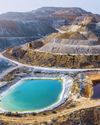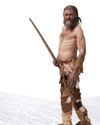An image: the workings of a municipal well pump facility, rows of machines looming inactive, gummed up with the white material clogging pistons and leaking glutinously from seams.

Another image: a logging site, cutters and trucks sitting abandoned among felled trees, all heavily draped with ropy pale webs.
Another: a surface mine, the pit floor invisible under white goop. An excavator stands in the background, sunk to the treads. A helmeted man lies mired near the pool’s edge, clearly exhausted, holding onto a rope stretching taut off screen.
Ann put down the tablet and looked at her visitor. “It’s getting worse, then,” she said.
“It’s overwhelming our ability to keep up,” the president agreed. “Worldwide. Always at sites of resource extraction. For a while it was just slowing things down, and the industries could clear it away and keep going. But it’s still spreading, still getting more intense. Some of these places have had their operations all but shut down; and if things keep going, within the next few years . . .” She shrugged in frustration.
Ann nodded gravely. She looked away from the younger woman, out her office window, not seeing the New Mexico landscape. “Any progress on tracing its origin?”
“No. It may have started in some isolated place, but with modern transportation and supply chains, it spread so quickly that it was everywhere before we knew it. I guess we can count ourselves lucky that it’s not infectious to humans, or this could have been the worst pandemic in history.”
“And how are we doing with resources now?”
The president looked grim.
This story is from the March 2017 edition of Muse Science Magazine for Kids.
Start your 7-day Magzter GOLD free trial to access thousands of curated premium stories, and 9,000+ magazines and newspapers.
Already a subscriber ? Sign In
This story is from the March 2017 edition of Muse Science Magazine for Kids.
Start your 7-day Magzter GOLD free trial to access thousands of curated premium stories, and 9,000+ magazines and newspapers.
Already a subscriber? Sign In

A 12-Year-Old Girl's Election Sticker Is a Winner
VOTING IS A FUNDAMENTAL FREEDOM FOR AMERICANS, A MEANS OF DOING ONE'S CIVIC DUTY AND A WAY AN INDIVIDUAL CAN EXPRESS THEIR VOICE. In 1971, the United States lowered its voting age to 18. But that doesn't mean kids and teens under 18 can't participate in elections in various ways.

If everything the human brain does is basically sets of electrical impulses, how exactly does that translate into a state of mind?
You're not the only one asking this question. Every neuroscientist in the world is wondering the exact same thing, says Zach Mainen

EARTH'S TINIEST BUILDERS
THE HIDDEN WORLD OF MICROBES IN THE EARTH'S CRUST

MUMMIES SPEAK
ABOUT MICROBES, MIGRATION, AND MORE

GOING WITH YOUR GUT
HOW DO MICROBES AFFECT OUR HEALTH? LET'S COUNT THE WAYS...

BUG Detective
A burglar sneaks into a house on a quiet street in New York City. He walks through the house, touching countertops and door handles. Finally, he steals a single card from a full deck. Then he leaves.

Little Creatures Among Us THE MANY MICROBES IN OUR DAILY LIVES
When you think you're alone, you're actually not. In the ground, the air, your room, and even your body are Strillions and trillions of creatures so tiny you can't see them.

A Mars Rock Found With Leopard Spots Could Be a Sign of Ancient Life
IN JULY, NASA'S PERSEVERANCE ROVER CAME ACROSS A SPOTTED ROCK IN WHAT WAS ONCE A RIVERBED IN THE JEZERO CRATER ON MARS.

Para Athlete Uses Exoskeleton Suit to Carry the Olympic Torch
In July, a 36-year-old French tennis para athlete, Kevin Piette, got a chance to participate in this summer’s Olympic torch relay without using a wheelchair.

Ancient Egyptians May Have Used a Water System to Lift Stones to Build Pyramid
HOW ANCIENT EGYPTIANS BUILT THE MASSIVE PYRAMIDS IN EGYPT MORE THAN 4,000 YEARS AGO HAS LONG BEEN A TOPIC OF WONDER AND DEBATE.